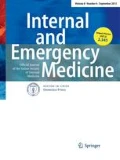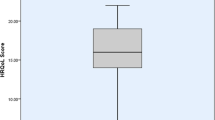Abstract
Beta-thalassemia major (TM), a chronic, genetically determined hematological disorder, has received little investigation on the psychological aspects of the disease and the psychosocial adjustment of patients with this anemia. Unfortunately, the few psychological studies referred on the literature are generally limited to the investigation of the only children with thalassemia major. The study was planned to assess the self-image, the quality of life, the way of coping and to investigate the existence of psychiatric disorders in young adults with thalassemia major. 147 patients were included in the study. Patients were psychologically investigated by three interviews: the first connects some psychosocial information, the second submits patients to the psychological test and the third gives back the results obtained by the test. The psychological test consists of the ways of coping questionnaire (WCQ), the Machover’s test, The short form 36-health survey questionnaire (SF-36) and symptom-check-list-90 revised (SCL-90-R) were performed on all patients. Vis-à-vis identity and self-image were found to be low with feeling of insufficiency and being exposed to vulnerability in 80% of patients with TM. Evaluation of mean values of symptomatological dimensions in these patients showed a personality characterized by somatization (SOM), depression (DEP) and obsessive-compulsive traits. The principal coping strategy used is escape-avoidance. No statistically significant differences occurred to relation to gender, age, level education and SCL-90-R and WCQ scores. Estimation of the SF-36 scores showed that the emotional role and social function values were considerably lower than in all of the domain. As a result, the study showed that most of the patients with TM had severe psychosocial problems. Relying on these data, it was concluded that medical therapy of these patients should be supported with psychological aid and psychiatric treatment.

Similar content being viewed by others
References
Yesim A, Serpil E, Nagihan B, Deniz Y, Ufuk S (2005) Psychosocial implications of thalassemia Major. Pediatr Int 47:84–89
Di Palma A, Vullo C, Zani B, Facchini A (2002) A psychosocial integration of adolescents and young adults with thalassemia major. Eur Child Adolesc Psychiatry 11:85–91
Ratip S, Modell B (1996) Psychological and sociological aspects of the thalassemia. Semin Haematol 33:53–65
Yang HC, Chen YC, Lin KH (2001) Illness knowledge, social support and self care behavior in adolescents with beta-thalassemia major. Hu Li Yan Jiu 9:114–124
Georganda E (1990) The impact of talassemia on body image, self-image, and self-esteem. Ann NY Acad Sci 612:466–472
Masera G, Monguzzi W, Tornotti G, Lo Iacono B et al (1990) Psychosocial support in thalassemia major: Monza center’s experience. Haematologica 75(5):181–190
Giordano V (1985) Psychosocial impacts on a thalassemic patient’s life. Ann NY Acad Sci 445:324–326
Polimeno G, Savarese M, Antonaci F et al (1988) Personality features in thalassemia intermedia: SCL–90-R and illness behavior questionnaire results. Ann NY Acad Sci 5:425–432
Vardaki M, Philalithis A, Vlachonikolis I (2004) Factors associated with the attitudes and expectations of patients suffering from beta-thalassaemia: a cross-sectional study. Scand J Caring Sci 18:177–187
Messina G, Cassinerio E, Volpato E. et al.: Symptoms check-list 90-R and ways of coping questionnaire in adult patients with thalassemia major: a preliminary study. Abstract 108° National Congress of SIMI, 2007
Battiato I (1990) Psychological aspect within the family of thalassemic subjects. Haematologica 75:191–192
Tsiantis J (1990) Family reactions and relationships in Thalassemia. Ann NY Acad Sci 612:451–461
Ratip S, Skuse D, Porter J, Wonke B, Yardumian A, Modell B (1995) Psychosocial and clinical burden of Thalassemia intermedia and its implications for parental diagnosis. Arch Dis Child 72:408–412
Thompson R, Karen M, Abrams MR, Phillips G (1996) Psychological adjustment of adults with sickle cell anemia: stability over 20 months, correlates, and predictors. J Clin Psych 52:253–261
Politis C, Di Palma A et al (1990) Social integration of the older thalassaemic patient. Arch Dis Child 65:984–986
Bush S, Mandel F, Giardina P (1998) Future orientation and life expectations of adolescents and young adults with Thalassemia major. Ann NY Acad Sci 850:361–369
Goldbeck L, Baving A, Kohne E (2003) Psychosocial aspects of beta-thalassemia: distress, coping and adherence. Int J Nurs Pract 9:131–139
Meijer SA, Sinnema G, Bijstra JO, Mellenbergh GJ, Wolters WH (2002) Coping styles and locus of control as predictors for psychological adjustment of adolescents with a chronic illness. Soc Sci Med 54:1453–1461
Santavirta N, Bjorvell H, Koivumaki E et al (1996) The factor structure of coping strategies in hemophilia. J Psych Lese 6:617–624
Marvasti VE, Dastoori P, Karimi M (2006) Is β-thalassemia trait a risk factor for developing depression in young adults? Ann Hematol 85:873–874
Author information
Authors and Affiliations
Corresponding author
Rights and permissions
About this article
Cite this article
Messina, G., Colombo, E., Cassinerio, E. et al. Psychosocial aspects and psychiatric disorders in young adult with thalassemia major. Intern Emerg Med 3, 339–343 (2008). https://doi.org/10.1007/s11739-008-0166-7
Received:
Accepted:
Published:
Issue Date:
DOI: https://doi.org/10.1007/s11739-008-0166-7




